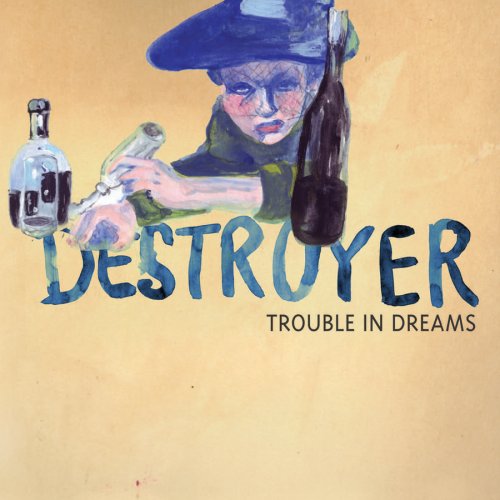
Destroyer
Trouble in Dreams
(Merge; 2008)
By David Greenwald | 19 March 2008
There’s a scene in last year’s Walk Hard: The Dewey Cox Story where the title character (an impressionable, affable John C. Reilly) goes through a Dylan phase, spouting off lyrics as impenetrable as this night advancing on. It’s a poke at the songwriter’s mid-career obscurist bent, but is it more satire or tribute? Or something else entirely? Don’t ask Dan Bejar. The man behind Destroyer has made a career on penning lyrics inscrutably filled with pop culture and metatextual references, exotic locales and fictional characters torn from urban bohemia and medieval castles alike. Bejar’s stuff is bursting with even more non-sequitors than old Bob, who at least had the courtesy to write the occasional linear narrative. My esteemed colleague Conrad Amenta argues that Bejar’s blather, especially on this, the Canadian songwriter’s eighth album under the nom de plume, has long since sunk into inconsequential scribbling. Perhaps it has. But like Dylan-as-songwriter ignores Dylan-as-singer (not to mention guitarist), Trouble in Dreams is an album of theatrical showmanship and musical evolution that goes far beyond parsing the meaning of Jenny falling like a ton of bricks or starving in that shit-house, the world.
If Destroyer’s Rubies was an album of hooks—an explosion of them—Trouble in Dreams is one of aura and rock ‘n’ roll ferocity. In many ways, Rubies_—my favorite album of 2006 and granted, a more focused collection than this—was a sonic warm-up for _Trouble. Rubies found Bejar backed by a new band (now the permanent Destroyer lineup) and recording with the fresh sheen of high fidelity. While Destroyer has never been as blatantly accessible as the New Pornographers, who Bejar moonlights for, the cleaner sound put to rest a past Hunky Dory_-era Bowie playing into a four-track vibe (see: 2001’s _Streethawk: A Seduction) and allowed undeniable melodies to shine forth.
The same production quality is at play here, and the band uses it to reach deep into the Destroyer catalog to create their strangest, most expansive music yet. Take “Shooting Rockets”: the eight-minute classic rock epic piles MIDI keyboards straight from Your Blues (2004) on top of a lurching pentatonic riff, avoiding a chorus in favor of a hypnotic throb. Keyboards also flesh out songs such as the elegiac “Foam Hands” and “Leopard of Honor” while guitar choirs sing on “Libby’s First Sunrise” and “My Favorite Year.” The band hasn’t gone all King Crimson on us—on those tracks, the increased instrumentation is more shoegaze-y texture than prog-rock fodder. And there are plenty of straightforward, _Rubies_-esque pop songs: “Blue Flower/Blue Flame” opens with acoustic strumming not far removed from “Rubies” and “Introducing Angels” is a hook-laden return to Bejar’s ba-da-das. Still, this is thoughtful music, sad and lush as it is tuneful.
So why the blue mood, Dan? Ever obtuse, Bejar has said that there’s no code to his writing, no secrets—merely whatever confusing half-truths we can wring from it. That makes his cleverness and wry wordplay no less enjoyable. He’s certainly a more mellifluous phraser than bookish contemporaries such as Andrew Bird, whose most recent crowning achievement is the chorus “Elephants, sycophants, elephants.” Hoping for lyrical revelations on a Destroyer album is usually too much to ask, but on Trouble, he actually seems to be saying something.
Images of light and darkness permeate the songs, and the album’s title points directly at a tension between day and night. “We live in a darkness / The light is a dream, you see” Bejar sings in “Shooting Rockets,” and “Every night is a stand-off with the fucking horizon” in “Rivers.” “Libby’s First Sunrise” seems to confuse day with night, and pit the two against each other: “Libby’s first sunrise / You’ve been wasted from the day / Of wandering and boozing and sleeping outside / Now the light holds a terrible secret.” It’s a questioning of the binary’s traditional dual roles and perhaps a subtle critique of a materialistic nightlife culture. In “Dark Leaves Form a Thread,” he sings “I’ve been living in America, churches of greed / It’s sick / Nah, it’s cool.” The Arcade Fire would’ve stopped before that last bit, but the sarcasm both implicates him and self-awarely jabs at his own complacence. The confusion of day/night/dreams seems to reflect a disconnect in personal identity, and indeed, Bejar often seems to drift out of awareness: “I didn’t know what time it was at all,” he sings in “Foam Hands.” He even ponders his own artistic position on “Shooting Rockets,” defensively noting “It’s not that my poems are shit.” On prior albums, he’s attempted to build (albeit oblique) lyrical worlds of his own, but this time he sounds lost in ours, trapped in a scene he disdains.
But picking apart Bejar’s ramblings on the lyric sheet leaves out an important component: Bejar himself. His theatrical bark is one of indie rock’s most distinctive sounds—his delivery of “Every night is a stand-off with the fucking horizon” is at least as important as that line’s meaning. Like Bowie before him, he recognizes the importance of putting on a show. To be sure, he’s always been more dramatist than singer: his performances here will do nothing to convince those dissuaded by his vocals on previous albums, but the adventurousness of the music—one minute, “Imagine”-like piano balladry, the next, wooshing dream-pop—could be enough to enlist new members of the Cult of Destroyer.
Like any album, Trouble has its highs (the second chorus of “Rivers,” all eight minutes of “Shooting Rockets”) and lows (“The State,” a messy rocker that all but collapses in upon itself), but the band’s prowess and Bejar’s vision makes the songs an impressive, if jagged, piece of work. Where Destroyer goes after this is anybody’s guess—it’s hard to imagine them getting more pop than “Introducing Angels” or more avant than “Shooting Rockets,” but this is Trouble’s triumph: In an album questioning identity, Bejar has never sounded more sure of his art.





